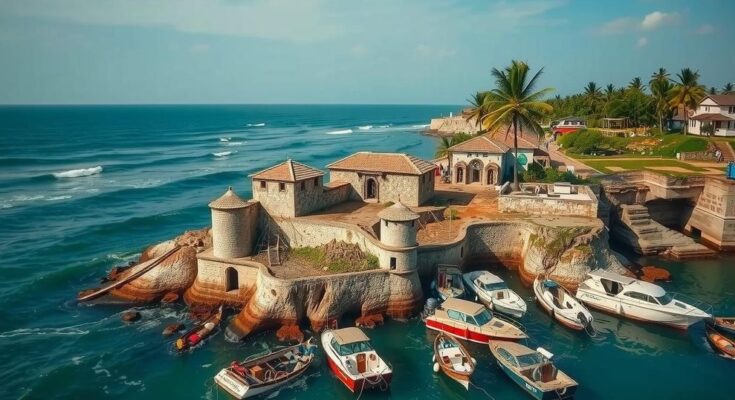Ghana is losing historic coastal forts to climate change, facing severe erosion from tidal waves that threaten both the structures and nearby communities. Forts like Prinzenstein and Kongenstein are at risk, with some completely submerged. Initiatives such as the Keta Sea Defence Wall and the West Africa Coastal Areas Resilience Investment Project are being implemented to address coastal erosion and protect vulnerable regions.
Ghana is experiencing substantial loss of its historic coastal forts due to climate change, particularly the intense tidal waves from the Atlantic Ocean. Over the past decade, regions along the 550-kilometer coastline have faced significant erosion, with projections indicating an annual loss of approximately two meters. In extreme cases, some areas have lost up to 17 meters, as reported by the Institute for Environment and Sanitation Studies. Among the historic structures at risk is Fort Prinzenstein in Keta, Volta Region, which has endured extensive damage with around two-thirds now submerged under the sea. James Ocloo Akorli, the fort’s caretaker, remarked, “Eight of its ten dungeons, originally built to hold enslaved Africans during the trans-Atlantic slave trade, were completely submerged before a sea defense wall was erected to protect what remains of the monument.” Similarly, Fort Kongenstein in Ada and Fort Fredensborg in Old Ningo have succumbed to the relentless waves, with traces of the former posts completely erased. The peril does not end with the forts; entire coastal communities are also jeopardized, facing displacement as the sea encroaches on their lands. Akorli Simon, a former resident of Fuveme, expressed the devastation faced by his community: “The Sea began swallowing our community. We were devastated and had to abandon Fuveme in 2016 after a powerful tidal surge washed away the land.” Communities such as Anlo village have shrunk alarmingly, leaving only a narrow strip of land between the rising tides and the lagoon fed by the River Pra. The city of Accra has similarly seen many residents abandon their homes due to severely damaging tidal waves. In response to these challenges, interventions such as the 8.3-kilometer Keta Sea Defence Wall, funded by the United States Export-Import Bank, and the West Africa Coastal Areas Resilience Investment Project have been initiated. The latter, a $155 million endeavor funded by the World Bank, aims to enhance resilience along critical coastal areas like Korle Lagoon and Densu Basin, which have historically faced significant tidal and flooding challenges. Minister of Environment, Science, Technology, and Innovation, Ophelia Mensah Hayford, emphasized the importance of these projects in combating the impacts of climate change on Ghana’s coastline.
Ghana’s coastline, historically rich with forts dating back over two centuries, is under severe threat from climate change-induced coastal erosion. The increasing intensity of tidal waves and rising sea levels jeopardizes not only these historical structures but also the livelihoods of communities residing along the coast. As coastal erosion continues, projections indicate that Ghana could lose significant land area annually, necessitating immediate intervention and resilience-building initiatives.
In conclusion, Ghana’s historic coastal forts and vulnerable communities are facing critical threats due to climate change and coastal erosion, with significant annual losses reported. While efforts are underway to combat these challenges through various projects, the ongoing situation highlights the urgent need for sustained attention and action to preserve both cultural heritage and community livelihoods along Ghana’s coastline.
Original Source: www.rfi.fr




